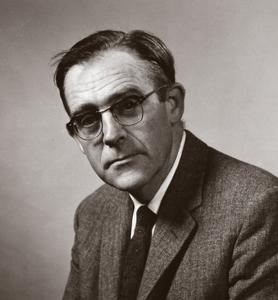Charles Stevenson facts for kids
Quick facts for kids
Charles Stevenson
|
|
|---|---|
 |
|
| Born |
Charles Leslie Stevenson
June 27, 1908 Cincinnati, Ohio, US
|
| Died | March 14, 1979 (aged 70) Bennington, Vermont, US
|
| Alma mater | |
|
Notable work
|
Ethics and Language (1944) |
| Spouse(s) |
|
| Children |
|
| Scientific career | |
| Institutions |
|
| Thesis | The Emotive Meaning of Ethical Terms (1935) |
| Doctoral students | Joel Feinberg |
| Influences | |
| Influenced |
|
Charles Leslie Stevenson (1908–1979) was an American philosopher. He was known for his work in ethics and aesthetics. Ethics is the study of right and wrong. Aesthetics is the study of beauty and art.
Contents
Who Was Charles Stevenson?
Charles Leslie Stevenson was born on June 27, 1908, in Cincinnati, Ohio. He grew up to become a very important thinker. He studied at top universities like Yale University and Harvard University. He also studied at the University of Cambridge in England.
His Education and Early Life
Stevenson earned his PhD in philosophy in 1935. His main paper was about "The Emotive Meaning of Ethical Terms." This paper explored how our feelings connect to what we say is right or wrong. He was interested in how people use language when talking about moral issues.
What Did Charles Stevenson Study?
Stevenson focused on a part of philosophy called meta-ethics. This area looks at the meaning of ethical words. It also explores how we know what is right or wrong. He wanted to understand what happens when people disagree about moral topics.
Ethics and Language
His most famous book is Ethics and Language, published in 1944. In this book, he shared his main ideas about ethics. He believed that moral statements are not just facts. Instead, they often show our feelings or try to influence others.
Understanding Emotivism
Stevenson is best known for his idea called emotivism. This idea suggests that when we say something is "good" or "bad," we are often expressing our emotions. For example, saying "Stealing is wrong" might be like saying "Boo! Stealing!" It also tries to make others feel the same way.
Emotivism says that moral words are like tools. They help us share our feelings. They also help us encourage others to act in certain ways. This was a new way to think about how we use language in moral discussions.
Where Did He Work?
Charles Stevenson taught at several universities. He worked at the University of Michigan for many years. Later, he also taught at Bennington College. He helped many students learn about philosophy. One of his notable students was Joel Feinberg, who became a famous philosopher too.
His Legacy
Charles Stevenson passed away on March 14, 1979. His ideas about emotivism greatly influenced philosophy. They made people think differently about moral language. His work is still studied today by philosophers around the world. He helped shape how we understand ethics and how we talk about right and wrong.

